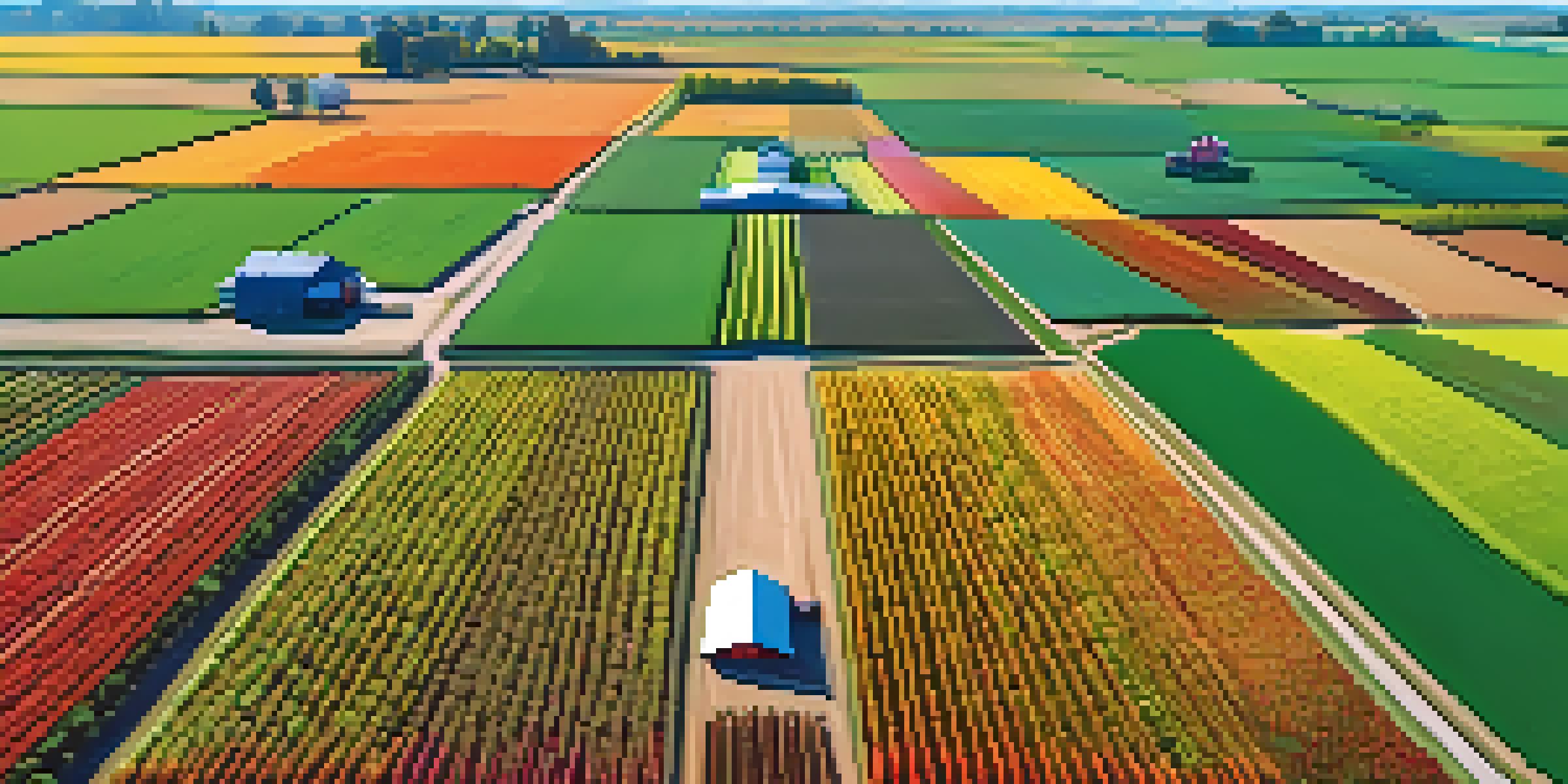Future of Georgia's Agriculture: Trends and Predictions

Emerging Technologies Transforming Farming Practices
As we look to the future, technology is set to play a pivotal role in Georgia's agriculture. Innovations like precision farming, which utilizes GPS and IoT devices, allow farmers to monitor crop health and optimize resource use. This means reduced waste and increased yield, which is essential for sustainability.
Agriculture is our wisest pursuit, because it will in the end contribute most to real wealth, good morals, and happiness.
Moreover, the rise of automation in agriculture—from drones that assist in planting to robots that harvest crops—is streamlining labor-intensive processes. This shift not only boosts productivity but also addresses labor shortages that many farmers face today.
In addition, data analytics is becoming a game-changer, enabling farmers to make informed decisions based on real-time data. By harnessing these technologies, Georgia's agricultural sector is poised for a smarter, more efficient future.
Sustainability: A Core Focus for Future Farming
Sustainability is no longer just a buzzword; it's becoming the backbone of agricultural practices in Georgia. Farmers are increasingly adopting methods like crop rotation and cover cropping to maintain soil health and reduce environmental impact. These practices help in preserving the land for future generations.

Furthermore, sustainable practices often go hand-in-hand with organic farming. As consumer demand for organic products rises, many Georgia farmers are transitioning to organic methods, which not only meet market needs but also promote biodiversity.
Technology Revolutionizes Farming
Emerging technologies like precision farming and automation are enhancing productivity and sustainability in Georgia's agriculture.
By prioritizing sustainability, Georgia's agriculture can thrive while also playing a crucial role in combating climate change and protecting natural resources.
Shifting Consumer Preferences and Their Impact
Today's consumers are more informed and conscious about their food choices than ever before. This shift towards health consciousness and local sourcing is influencing what Georgia farmers grow and sell. Many consumers now prefer locally-sourced produce, which has fueled the growth of farmer's markets and community-supported agriculture.
The future of agriculture is not about technology, it's about using technology to achieve sustainability.
In response, farmers are adapting by diversifying their crops and focusing on organic and sustainable practices. This not only meets consumer demand but also opens up new markets, creating opportunities for farmers to thrive.
As these trends continue, we can expect Georgia's agricultural landscape to evolve, reflecting the preferences and values of its consumers.
Climate Change: Challenges and Opportunities
Climate change poses significant challenges to agriculture in Georgia, impacting everything from crop yields to pest management. Increased temperatures and unpredictable weather patterns can disrupt traditional farming practices, leading to lower productivity.
However, these challenges also present opportunities for innovation. Farmers are increasingly exploring climate-resilient crops and adaptive farming techniques to mitigate risks and ensure food security. This proactive approach can not only safeguard their livelihoods but also contribute to the broader fight against climate change.
Sustainability Drives Agricultural Practices
Farmers in Georgia are increasingly adopting sustainable methods to meet consumer demands and protect natural resources.
As Georgia's farmers navigate these challenges, their resilience and adaptability will be crucial in shaping the future of agriculture in the region.
The Role of Policy in Agricultural Advancement
Government policies play a vital role in shaping the future of agriculture in Georgia. Supportive policies can foster innovation, provide financial assistance, and promote sustainable practices among farmers. For instance, subsidies for adopting new technologies can significantly reduce the financial burden on farmers.
Moreover, initiatives aimed at protecting natural resources and enhancing rural development can create a thriving agricultural ecosystem. By prioritizing policies that support sustainable agriculture, Georgia can ensure a robust agricultural sector that benefits both farmers and consumers.
As stakeholders collaborate to influence policy, the future of Georgia's agriculture can be guided towards sustainable growth and resilience.
Expanding Export Opportunities for Georgia Farmers
Georgia's agriculture is not only vital for local consumption but also holds immense potential for exports. As global demand for agricultural products increases, Georgia farmers have the opportunity to tap into international markets. This can lead to increased revenues and job creation within the state.
To capitalize on these opportunities, farmers will need to adapt their production methods to meet the quality and safety standards of international markets. This may involve investing in technology and training to ensure compliance with regulations.
Education Shapes Future Farmers
Investing in education and mentorship is crucial for equipping the next generation of farmers with necessary skills and knowledge.
By expanding their reach beyond state lines, Georgia's farmers can contribute to the state's economy while showcasing the quality and diversity of their products on a global stage.
Education and Training: Shaping the Next Generation of Farmers
The future of Georgia's agriculture heavily relies on education and training for the next generation of farmers. Providing access to agricultural education, from high school programs to university degrees, ensures that young people are equipped with the knowledge and skills needed for modern farming.
Additionally, mentorship programs that connect experienced farmers with newcomers can foster innovation and knowledge-sharing. These relationships can help new farmers navigate challenges and embrace new technologies, ensuring a smooth transition into the industry.

Investing in educational initiatives not only prepares the workforce for the future but also promotes a culture of innovation and sustainability within Georgia's agricultural community.